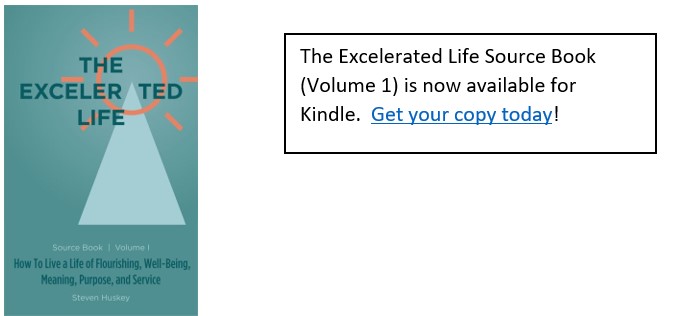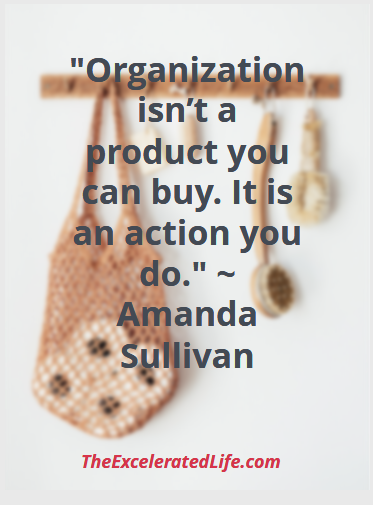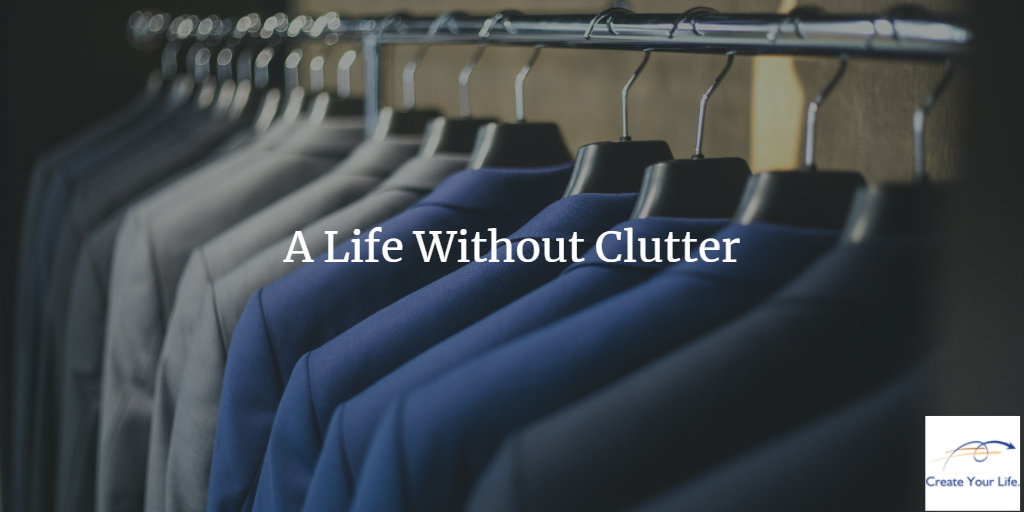Despite our best efforts to keep an organized environment, clutter has a way of finding its way in. It’s a good idea to take inventory from time to time to be sure we have clutter under control and that we are moving toward a life without clutter.
Death By Clutter?
Sometime in April 2010, in Las Vegas, 67-year-old Billie Jean James went missing. Ms. James was described by her friends as a hoarder; her house was piled with items she bought at local thrift shops. When her husband, Bill, reported her missing, the police came in and searched for her, even using police dogs to try to sniff her out. But although they searched on several occasions, there was no sign of her in the house.
Some four months later, Bill noticed “a pair of feet poking from beneath a ‘floor-to-ceiling pile of junk'”. Bill had found the missing Billie Jean. Apparently, she was buried underneath so much junk, even the dogs couldn’t locate her. A hoarding expert, Dr. David Tolin, said that “death by hoarding” is not unheard of. “Every year,” Dr. Tolin stated, “there’s at least a few deaths that can be attributed to hoarding.” [Gibson]

Why Aim For a Life Without Clutter?
Now, while you and I may not be full-blown hoarders, it’s good to take inventory from time to time to be sure we have clutter under control, that we are “well-enough organized”, and that we are moving toward a life without clutter.
While “death by clutter” may not be a threat to you, there are good reasons to remove clutter from your life. For example, think of the costs. Not only of money but also the time and energy costs.
Everything you own presents a need – a need to clean, to maintain, and to store. Anything you can let go of frees up time and energy and space and moves you closer to being well-enough organized.
How To Move Toward a Life Without Clutter
Keep in mind that removing clutter and organizing are not synonymous. Decluttering is the first step; it makes organizing much easier. Otherwise, you’re simply organizing clutter.
So focus first on removing the clutter, then organize what’s left. Your job will be far simpler. Here are six areas to concentrate on as you move toward a life without clutter.
Prioritize Needs, Not Wants
A great way to limit clutter is by not bringing it home in the first place. Use willpower at the store. If you want to not eat cookies, don’t bring cookies home. Similarly, if you want less clutter, don’t bring home things you don’t need.
Be clear about what constitutes a need for you versus a want. For example, “I need that new set of golf clubs!” isn’t a need. It’s a want.
Buy less but buy better. When you don’t spend money on unnecessary items, you can spend more on the items you do buy. Go for quality and select items that are going to last for a long time. Then, you won’t have to buy them as frequently.
When you are considering purchasing a new item, ask yourself these questions:
- Why do I need this?
- Will I use it?
- What would I use if I didn’t have it?
[Becker]
By truthfully answering these questions, you’ll buy more things you need and less you don’t and begin living a life without clutter.
Give Everything a Home
“At the most basic level, all organizing is just grouping like items with like, in one location.” ~ Amanda Sullivan
“A place for everything and everything in its place.” I grew up hearing that saying from my mother, over and over. And it’s a great idea for reducing clutter and keeping things organized. Just be sure the things you give a home are things you really need and use
When you are looking for homes for your possessions, keep these thoughts in mind:
- Store like with like.
- Store things close to where you use them.
- Remember the “centers” in kindergarten? You may have had an art center, a reading center, a center for building blocks, and so forth. Each center had all the things you needed for that activity. Use the same concept for storing your possessions at home.
- Before you bring something home, decide where it will live.
Purge Early, Purge Often
Despite your best efforts to keep an organized environment, clutter has a way of finding its way in. It’s a good idea to look around periodically and get rid of that piled-up mail, the clothes you no longer wear, those weeks-old newspapers, and the other miscellanea that seem to pile up when you aren’t looking.
But don’t declutter mindlessly. To properly deal with an item, you must make a decision as to its purpose and usefulness. Use Joshua Becker’s three questions that we talked about earlier.
- Why do I need this?
- Will I use it?
- What would I use if I didn’t have it?
Make a Habit of Putting Stuff Away
“No matter how organized you make your space,” writes Amanda Sullivan in Organized Enough, “it won’t stay that way if you don’t have good habits.”
It is much easier to stay organized and clutter-free when you make a habit of putting things back after you’re finished with them. For example, which do you think is easier, hanging up your clothes when you take them off at the end of the day? Or sorting through all the clothes piled on a chair or the floor at the end of the week, picking out the dirty things from the clean, and hanging up the week’s worth all at once?
To put things away, it is essential that you have a home for everything, as we discussed earlier.
If you feel overwhelmed by all the stuff that isn’t in its place or that doesn’t have a home, try using the Zorro Circle that we’ve discussed before.

Use the One In, One Out Rule
Stop clutter before it enters your home by using a “one in, one out” policy. When you buy something new to bring into the home, decide one thing you’ll let go of. This is especially helpful for clothes and shoes, but keep it in mind for kitchen gadgets, unusual tools, and toys.
If you’re replacing something that’s broken, toss the broken one first. If you’re tempted to hang on to it with the idea that you might be able to repair it “someday”, consider this: How many broken items have you repaired in the past? If you’re handy that way, why not repair the damaged item instead of buying a new one?
Remember, it’s much easier to create a life without clutter by not letting it in to begin with
Focus on Experiences, Not Things
I saw this at my local ice cream parlor: “Money can’t buy happiness, but it can buy ice cream and that’s almost the same thing.” And my family will tell you that I wholeheartedly embrace that philosophy!
Research indicates that spending on experiences brings more happiness than buying material goods. Of course, we can’t compare buying a new pair of shoes to going on a cruise, but when the researchers compared purchases and experiences of similar costs, they found that “participants who consumed experiential purchases versus material ones in every category, regardless of the cost of the item” scored higher on a happiness assessment. [Simon]
If you’re looking for a mood boost, consider dining out, attending a movie, a concert, or a play, or taking in a sporting event rather than buying new clothing, jewelry, furniture, or other purchases. For the same amount of money, and maybe less, you’ll be happier longer.
And there’s always ice cream!
Never Give Up
As you begin the journey toward a life without clutter, keep in mind that this is not a one-and-done effort. It is a practice and like other practices, you aren’t expected to get it perfect. Just aim to get a little better each day.
Begin with the steps we’ve discussed here. Then, for specific tips, you can browse TheExceleratedLife.com archives for articles on Excelerated Organization™.
Above all, keep in mind that you will have setbacks and you may “accidentally” purchase things you don’t need or even want. When that happens, forgive yourself and try again. Remember it’s clutter-free practice, not clutter-free perfection.
As you practice, work on small steps to reduce the clutter, such as the Zorro Circle. Cultivate consistency and turn your small steps into habits. And as you turn these positive behaviors into habits, living an organized and clutter-free life becomes easier and easier. That’s how you cultivate Excelerated Organization™. And that is one step in creating your Excelerated Life™!
What part of your office, your home, or your life needs tidying up?
What could you do today to begin clearing out the clutter?
Share your ideas by leaving a post below.
Excelerated Organization™ — being clutter-free and well-enough organized (able to find what you need when you need it) — is one step in creating your Excelerated Life™, a life of flourishing and well-being, and a life of meaning, purpose, and service.
Read more about the Excelerated Life™.
Resources:
Becker, Joshua. “Spring Decluttering is Better than Spring Cleaning.” becomingminimalist. Joshua Becker,. Web. September 29, 2022.
https://www.becomingminimalist.com/spring-decluttering/
Gibson, Megan. “Woman’s Body Found Under House Clutter After Four Months.” Time. Time USA, LLC., Aug. 28, 2010.
Simon, Jeremy. “Spending on Experiences Versus Possessions Advances More Immediate Happiness.”
UT News. The University of Texas at Austin, March 9, 2020. Web. March 27, 2023.
https://news.utexas.edu/2020/03/09/spending-on-experiences-versus-possessions-advances-more-immediate-happiness/
Sullivan, Amanda. Organized Enough. Philadelphia, PA: Da Capo Press, an Imprint of Perseus Books, LLC, 2017.


